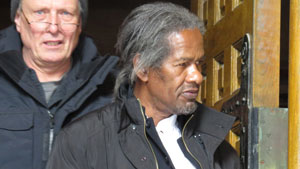Lawyers across Ontario are showing unprecedented support for a colleague sentenced to two years in prison last week for smuggling marijuana into Toronto’s Don Jail, a Criminal Lawyers’ Association spokesman says.

Deryk Gravesande, 61, nodded to supporters at the Old City Hall courthouse Tuesday as he was handcuffed and led away following Ontario Court Justice Wayne Rabley’s acceptance of a joint Crown-defence sentencing submission.
Prominent counsel Marie Henein and Scott Hutchison have agreed to argue his appeal
pro bono, and a number of lawyers have offered to help cover disbursements, says Jonathan Rosenthal, vice president of the Criminal Lawyers’ Association.
“He is a person who, I think, has been universally liked by everyone in the criminal justice system for a long time,” Rosenthal tells
Law Times.
“This is certainly a unique situation as far as the support that Mr. Gravesande is receiving throughout the province.”
In addition, many lawyers have read the February judgment convicting him on a count of drug trafficking and “have found it problematic from a legal standpoint,” says Rosenthal.
Rabley found Gravesande had passed 58 grams of marijuana to a former client while visiting him at the now-defunct Don Jail on the evening of Jan. 20, 2012.
Two correctional officers testified Gravesande smelled strongly of cologne and marijuana as he approached a jail visiting room.
Although Rabley found correctional officers hadn’t follow proper strip-search procedures when checking the prisoner for contraband before he saw Gravesande, the judge nevertheless said there was enough circumstantial evidence to convict the lawyer.
The guards found the drugs in a sock inside the waistband of the prisoner’s underwear after the visit.
Rabley said he couldn’t point to any part of Gravesande’s testimony denying guilt that was implausible or unbelievable but noted “that does not mean that I found his evidence compelling enough to say that I believed him.”
In sentencing Gravesande, Rabley said lawyers have a particular responsibility to ensure the public sees their conduct as exemplary. “The Canadian justice system relies upon their honesty and integrity.”
The judge noted Gravesande is a well-respected member of the bar with no previous record. “His stature and reputation in the community have significantly been tarnished, if not destroyed, and he has paid a price from a health perspective because of it,” said Rabley.
“He made a grievous error in judgment and now must face his punishment.”
Rabley noted Gravesande’s colleagues, several of whom sent letters of support, speak highly of him. “They describe him as a talented, dedicated and fearless member of the bar. . . . All speak about a man who is passionate in his study of the law and is relentless in the pursuit of justice for his clients.”
The judge quoted a lawyer who wrote: “There is enormous support among colleagues at the bar for Mr. Gravesande, as I suspect, we who defend live with the belief that every man is better than their worst mistake.”
Rabley adopted comments by former Supreme Court justice Michel Bastarache, who wrote that lawyers convicted of a breach of trust, absent exceptional circumstances, have received jail sentences and should be seen to receive the same treatment as any other person convicted of a similar crime.
“Drugs are the scourge of all penal institutions,” said Rabley.
“People who are permitted into the facility with less scrutiny because of their professional status and who might bring drugs into a jail, must be held to a higher standard.”
Gravesande has suspended his law practice and has voluntarily withdrawn from the Law Society of Upper Canada.
Rosenthal said outside court he was troubled by the conviction given that the judge wouldn’t allow defence lawyer Frank Addario to introduce evidence about the prevalence of drugs in jails.
Addario told reporters jails are dangerous to defence counsel because of a drug epidemic.
“Inmates are ingenious about secreting the drugs and so lawyers depend for their safety on the quality of the pre-visit search of both the inmate and the room in which the inmate is going to be visited,” said Addario.
The grounds for appeal include an assertion that Rabley’s finding that the jail guards hadn’t followed search procedures should have left him with reasonable doubt as to Gravesande’s guilt.
Henein and Hutchison also argue the judge had misapplied the burden of proof on the Crown by acknowledging he didn’t find anything unworthy of belief in Gravesande’s testimony but nonetheless concluding the Crown had proven its case.
Addario said he expects the court will hear the appeal in the fall. Meanwhile, the Crown has consented to Gravesande’s renewed bail, he said.
In his sentencing arguments, Crown prosecutor Roderick Sonley called Gravesande’s crime a premeditated and sophisticated breach of trust by an officer of the court.
“This was a particularly egregious and aggravating factor,” he said.
“This is not a victimless crime,” Sonley told the judge. Gravesande’s conviction tarnishes thousands of honest members of the bar, particularly in Toronto, who will face increased scrutiny and public skepticism as a result, Sonley argued.
But Addario told the judge his client, who has practised law for 22 years, is generous with his time within the wider legal community.
Gravesande is known for his honesty, Addario added. “This is out of character.”
For more, see "
Lawyer's drug conviction raising hackles over custodial searches."

 Deryk Gravesande, 61, nodded to supporters at the Old City Hall courthouse Tuesday as he was handcuffed and led away following Ontario Court Justice Wayne Rabley’s acceptance of a joint Crown-defence sentencing submission.
Deryk Gravesande, 61, nodded to supporters at the Old City Hall courthouse Tuesday as he was handcuffed and led away following Ontario Court Justice Wayne Rabley’s acceptance of a joint Crown-defence sentencing submission.